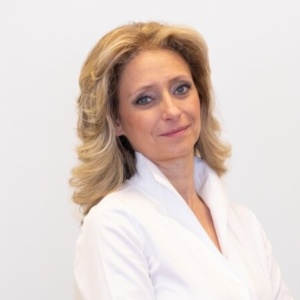
dr. Ferencz Orsolya
1996 óta dolgozik az ELTE TTK Földrajz- és Földtudományi Intézetében, 2006 óta tudományos főmunkatársként. Tagja a Magyar Tudományos Akadémia köztestületének. Kutatási témái közé tartozik többek között a magnetoszféra és az égitestek elektromágneses környezetének vizsgálata, illetve az űridőjárás.
2018 óta a Külgazdasági és Külügyminisztérium űrkutatásért felelős miniszteri biztosaként tudományos szempontból felügyeli az űrkutatási tárgyú nemzetközi és hazai szerződések tartalmára vonatkozóan a szükséges szabályozás kidolgozását, a szerződések előkészítését, egyeztetésével kapcsolatos feladatok ellátását. Felügyeli az űrkutatás fejlesztésére vonatkozó stratégiák, szakpolitikák tudományos szempontjainak összehangolását és megvalósítását. Javaslatot tesz a Kormány hazai és nemzetközi űrkutatási szervezetekben és fórumokon képviselt álláspontjára, illetve tudományos szempontból véleményezi és képviseli azt.
Az Európai Űrügynökség (ESA) magyar delegációjának vezetője.
She has been working at Eötvös Loránd University Institute of Geography and Earth Sciences since 1996, and from 2006 on as a senior associate. She is a member of the Hungarian Academy for Sciences’ Public Board. Her main research areas are the investigation of electromagnetic field of the magnetosphere and the electromagnetic surrounding of planets, and weather in space.
From 2018 on as the ministerial commissioner for space exploration of the Ministry of Foreign Affairs and Trade she supervises the preparation of local and international contracts related to space exploration, ensures that the legal background of those is valid and negotiates them from a scientific point of view. She supervises the fine-tuning and execution of strategies and policies directed to improve space research. She makes suggestions for the Government’s arguments in negotiations with local and international space research organisations and forums and scientifically reviews and represents them.
She is the head of the European Space Agency’s Hungarian delegation.
Véleménye szerint melyek a legérdekesebb és/vagy a legfontosabb tehetség-programok hazánkban?
- Mathias Corvinus Collegium (a teljes Kárpát-medencei magyarságra kiterjed)
- Nemzeti Tehetség Program és kiemelt programjai
- Szabó Kálmán Tehetségprogram (BCE-ELTE)
- Neumann Nemzetközi Tehetségkutató Programtermék Verseny (számítógépes programírás)
- Szentkirályi Tehetségprogram (sportok)
Miért fontos személyesen Önnek a tehetséggondozás?
Fontosságának legfőbb oka az, hogy az egyén és a közösség tartozik egymásnak:
- a tehetséges személy a sajátos értékeit a nagyobb emberi közösség javára fordítva teljesítheti be legjobban hivatását;
- a társadalom pedig felelős azért, hogy értékes tagjának kincsei fel legyenek fedezve, majd pedig azok hasznosulásához megteremtse a kifejlődés, a hatékony alkotás/munkavégzés és az érték-továbbadás feltételeit.
Van-e olyan program, amit külön kiemelne?
Űrkutatás és űrtevékenység terén jól működő hazai programok:
- „Irány az Űr” verseny – Magyar Asztronautikai Társaság
- „Space Challenge” verseny – Pécs
- CanSat Hungary verseny – szervezi a BME Kozmosz Kör
- First Lego League robotépítő verseny
Which are the most interesting and/or most important talent programs in Hungary in your opinion?
- Mathias Corvinus Collegium (open to all Hungarians in Carpathian Basin)
- The National Talent Program and its high priority projects
- Szabó Kálmán Talent Program (BCE-ELTE)
- Neumann National Talent Search Program Product Competition (computer programming)
- Szentkirályi Talent Program (sports)
Why is talent care important to you personally?
The main reason is that individuals and their communities have a mutual dependence on each other:
- talented individuals can best fulfil their mission by using their specific skills for the benefit of their broader environment or society,
- while society has a responsibility for recognising the virtues of its talented members and for creating the conditions for effective development, deployment and utilisation of those virtues, as well as passing on the value created.
Is there any program that you would specifically mention?
The successful domestic programs in the field of space research and space related activities:
- The “Head to space” contest of – the Hungarian Astronautical Society
- The “Space Challenge” competition – Pécs
- The CanSat Hungary competiton – organised by the BME Cosmos Society
The First Lego League robot building competition
